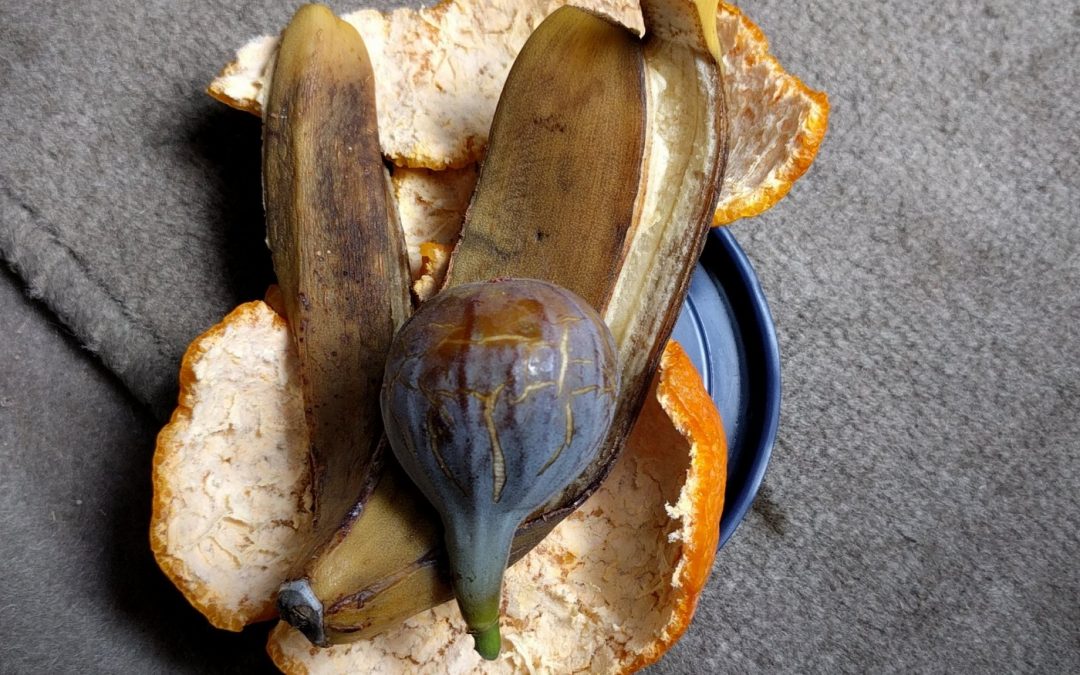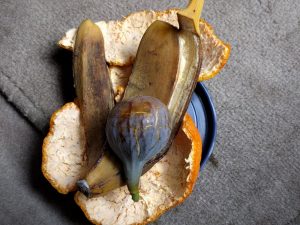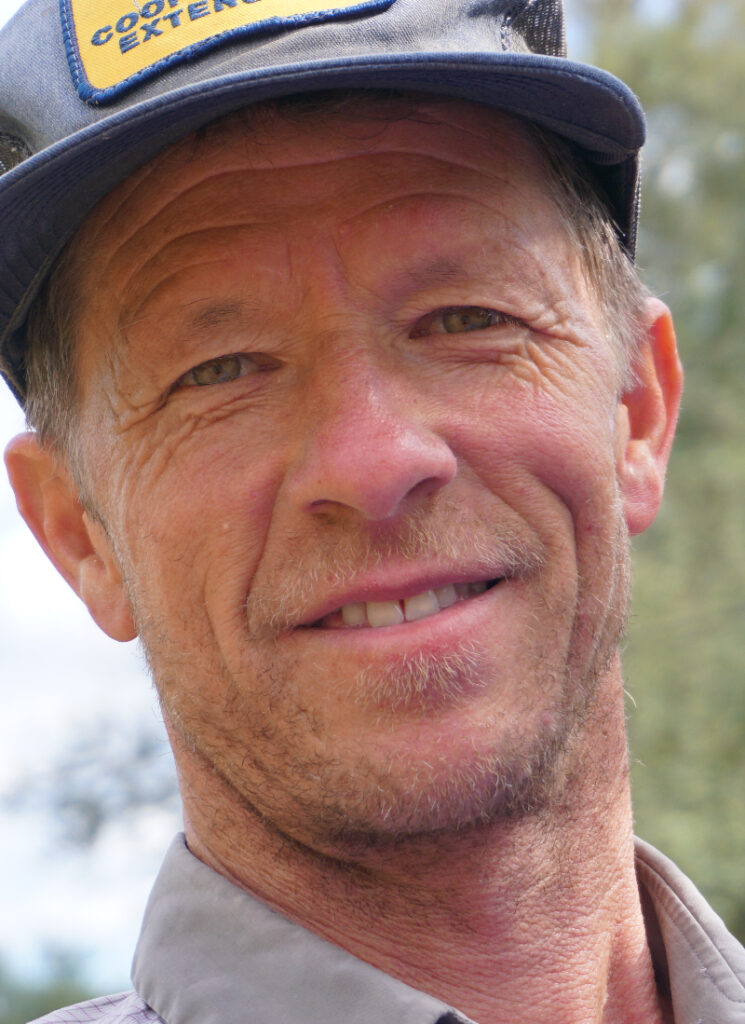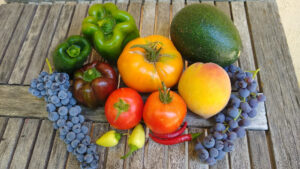I took this picture of a banana peel and an orange rind because they made me realize how weird I am, how weird we are as food gardeners. The banana peel and orange rind were lying on the floor mat of my truck; I was taking them home with me. There was a trash can in spitting distance, but I’d decided to keep the peel and rind for compost. This is trash to most people, but . . .
Food gardeners are . . . different.
Two days prior I’d been at my grandma’s house where we had a barbecue for my mom’s birthday and I went home with four bags of food waste — only I’d never asked for it. My grandma also grows vegetables and fruit trees. When I was young, she also had a coop full of chickens. She doesn’t compost much anymore because she generates very little food waste, but she knows the deal. She presented the corn husks, tomato stems, pineapple cuttings, etc. to me: “For your chickens.”
“Thanks, Grandma! I’ll turn them into eggs and bring you a few next time I visit.”
This summer has me down. A friend who gardens and lives nearby is also feeling low. We’re both in inland Southern California where July has been the worst July of all time, for food gardeners (and farmers). I talk to friends who live at the beach or friends who don’t garden and they act like nothing’s wrong. But we were despairing. Is 115 degrees going to be the new normal?
Our avocado trees are thrashed and browned. Much fruit has fallen to the ground. Our apples are burnt. And this comes after a warm and wacky winter that resulted in the worst fruit season for deciduous fruit trees that I’ve experienced.
Another friend who lives close to the beach and never experienced the 100-degree days that I did, did experience his apple, apricot, and nectarine trees barely growing leaves this spring and blooming flowers even more pathetically. He was so eager to share his Desert Delight nectarines with me this summer because he’s sure they’ll be the best I’ve ever tasted, but he doesn’t even have one fruit for himself.
We observe the weather, we food gardeners, we read the weather forecasts, we might even have our own weather station, and we think about the weather differently. Rain is not a nusaince to us. We’re quite willing to get our hair wet and our shoes muddy because we know what it does for our plants. More than welcome it, some of us even try to trap it and keep it in barrels. Others usher it down their driveways into the storm drains with nary a thought.
We notice that grapes in the grocery store are way bigger than natural.
We are impressed that farmworkers can pick corn on the cob at exactly the right time because we’ve messed that up in our gardens. Or how about picking watermelons from your garden at the right time?
Our water bill isn’t just an expense. Proper accounting has it partially deducted from our grocery bill.
We know that nectarine trees smell like nectarines even if they have no fruit on them.
And we think the food from our yards tastes wonderful even when it doesn’t. The banana peel and orange rind that I’d refused to throw in the trash and took a picture of were not just any banana peel and orange rind. They’d been ceremoniously eaten with a friend, because that’s what weird food gardeners do.
The orange rind was actually a Gold Nugget mandarin rind. The Gold Nugget had come from a farmers market and I was blown away at how good they tasted, especially here at the very end of July. They were better than the Gold Nuggets from my own tree. I had to share this one with a friend who also grows many citrus trees.
We also shared the banana. My mom had grown this one. I peeled it and then broke the little cream-colored guy in half and, after chewing and thinking, we both agreed that it beat store-bought Cavendish types.
“I like that it’s small,” he said. “By the time I’m near the end of a store-bought banana, I just want it to be over with.”
“Totally! And the texture’s better too.”
“Yeah, it’s not just mushy. And there’s some complexity to the flavor.”
“I think I taste some apple.”
“Yeah,” he agreed. “If anyone overheard our conversation right now they’d think we were so pretentious.”
We explored that. We explored it for about thirty minutes. He hoped his children would someday appreciate that they were able to walk out of their house and pick snacks of trees in the yard. He wished cities would plant fruit trees in public instead of only ornamental or shade trees. Many take the same amount of water and maintenance. In California, our grocery stores should have very small produce sections because we should be growing so much in our yards. He told a story of his mom secretly picking oranges from her neighbor’s tree which hung over her fence only to later find out that the neighbor didn’t even know it was an orange tree.
I volleyed with a story of the pastor of my mom’s church who had a large Fuerte avocado tree in his yard, and when I asked him if I could pick a couple he said I could have as many as I wanted. “We don’t eat them. My wife still just buys avocados at the grocery store,” he’d said.
But my friend and I wouldn’t always have been shocked by these stories. We may be food gardeners now, but in the past we’d been somewhat unaware too, about where food comes from, how to grow it, and even how to eat it. He said that the first time he grew zucchini he wasn’t sure what he needed to do after picking one in order to sanitize it to make it safe to eat. That’s what you grow up thinking when you buy food from a grocery store: Produce needs to be washed. You never ask why.
All of these ruminations had been sparked early that morning when my friend had announced: “You have to grow a Celestial fig.”
He had brought three from his tree for me to taste. We were in a beach parking lot because we were going to surf together, but before we could do that I had to go over to his car and taste. Each fig was at a slightly different stage of ripeness, my friend explained. He waxed about the variation in flavor that each would have.
He put the three in my hand and I ate the middle one, skin and all. I declared it delicious. It truly was delicious. But that wasn’t enough, of course. When you grow something, you get to know its nuances in a way you never had before, and it becomes your baby of which no one is prouder.
He talked about how he’d never really liked figs before growing his own, he got his knife out to cut the second one open so I could taste it without the skin — to get a more pure experience, he described the subtle change in skin color and how it indicates the flavor, he told me how he makes fig jam by scooping the pulp out and only adding a dash of cinnamon and it’s richer than any jam ever, he recounted how he checks his tree constantly but somehow a few had ripened rapidly and fallen to the ground without him noticing, he remembered how gophers and construction guys had nearly killed the tree in the past, and eventually I brought the third fig back to my truck. I’d eat it later, after we finally surfed, probably when I got home. Wow, my friend is . . . kind of nuts.
You might also like to read my posts:
https://gregalder.com/yardposts/gardening-with-kids/
https://gregalder.com/yardposts/what-is-organic-actually/
https://gregalder.com/yardposts/oh-mistakes-ive-made-thinking-flowers-girls/





I’ve been reading your posts for a while now and always find them informative. As a fellow food gardener (also flowers) and avid composter I totally get it. I too have friends saving banana peels, coffee grounds anything that can go into my compost bins. My gardener gets me dry leaves from his other job sites so I can use it as mulch. I live by the coast in Pacific Palisades, CA and this year was just sad as my normally very productive peach trees did absolutely nothing. I too was puzzled by the lack of leaf development. My Anna apples did really well though. Your posts help me understand that I am not alone and help to make small yet significant improvements to my techniques. I look forward to your next post…..
Hi Anupama,
Thank you so much for this very encouraging comment.
A quote from C.S. Lewis was in my mind while developing this post: “We read to know that we’re not alone.”
Hi Greg,
I begun following your posts associated with avocados. Now I am expecting each Friday to read the next one. This one I truly enjoyed it. It reflects your versatility and creativity. Now I need to WAIT one more week for the next one.
As a side note, do you remember one of your avocado posts in which you mentioned “chlorine” causing leave burning?…well I went ahead and installed chlorine filter for each avocado tree!!!
Hi Juan,
So pleased to read this. Thank you.
I think I know the post you’re referring to: Avocado leaves turning brown? Here’s why and what to do.
But it’s chloride that the researchers say causes the typical burning of leaf tips on avocados that usually starts appearing each fall. I also installed a filter (carbon) on the irrigation line to some of my avocado trees; however, I have no idea what the results will be since it’s supposed to remove only chlorine and NOT the anion chloride.
I figure it might still do some good since chlorine is a disinfectant, killing microbes, and without it my soil might become more lively. Just a small, uneducated experiment here on my part. Please tell us if you notice any effects on your trees later this fall; I’ll also report back then.
I live by SDSU and noticed that all of my early stone fruits flowered and produced as expected, however everything else is running about three weeks late. I suspect that the warm winter kept the early stuff on track and the cool spring really threw things off. That being said, we are currently experiencing a bumper crop of August Pride peaches from a tree that’s not all that big and have gobs of figs on a rather small tree. Another interesting thing to note this season is that my Minnie Royal cherry has started to blossom again and I suspect it’s because the heat from a few weeks ago burnt the leaves so it lost a bunch of them. I have a theory that the tree thinks it’ went into dormancy because of the defoliation and now thinks it spring. Back when I planted most of these trees I told my wife that there would be weird years (of which this is definitely one) and with all the variety we have (including tons of stone fruit with some high chill varieties, numerous citrus, and a bunch of exotics) it would all work out. Three of the four avocados had horrible leaf loss from the heat but they’re all making a come back now. Our mango tree is loaded and the passion fruit is growing like something out of that movie Little Shop of Horrors. All of the citrus is holding a lot of fruit but I still haven’t gotten a single persimmon to set. My apricots don’t seem to care if there’s normal weather or weird weather, they don’t produce very well regardless. Tomatoes have been goofy the whole year and about all that’s reliable is our Romas. What I’ve noticed and have talked to a few folks about is what we think the worst enemy of our gardens is this year; it has to be the massive amount of squirrels. The chickens obliterated the Japanese beetle grubs over the winter so squirrels win. I enjoy reading your posts and like to see that others are doing a lot of their own food production. Thank you for your insights.
Hi Bob,
Thanks for sharing all of that. It’s so interesting to hear what’s happening in other yards, and to find that many results are similar throughout our Southern California region, but not all.
I like your theory about why your cherry bloomed after the heat wave. My apples did the same. I’ve experienced that citrus also bloom after a period of severe stress: Some of my citrus trees once went without water for a long time, and when they finally received a good watering they bloomed even though it was summer (not spring) — although the flowers didn’t set fruit.
My abnormal apple flowers this month haven’t set fruit. Have your cherry flowers?
I’ve got a few rogue citrus flowers on several different varieties (primarily the lemon/lime types, kumquats and a calamondin) so I suspect they’ll actually set fruit as there is plenty to cross pollinate them but I doubt the cherry will set fruit as it’s the only one of my stone fruits that pushed out flowers. If they actually set something I’ll update you. The mango did manage to have a second flush and set a few more mangoes, but this is it’s first real year so I don’t know what to expect with it. No late apple blooms here. I typically don’t comment on blogs but find this blog rather fascinating as it deals primarily with Southern California and San Diego. I’ll look into your other posts and jump in here or there. You’re providing a wealth of knowledge for us; thank you for the good info.